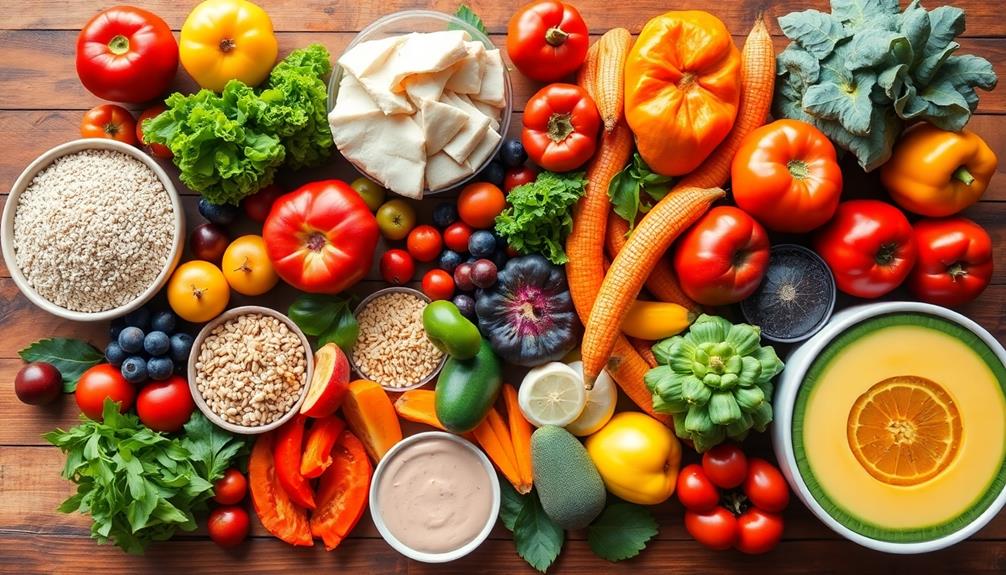Your food preferences change significantly during pregnancy as a result of hormonal changes, heightened sensitivities, and emotional factors. Cravings for sweet, salty, or sour foods may emerge while developing aversions to coffee, spicy dishes, or fatty items. These shifts in cravings and aversions can vary from trimester to trimester; for instance, comforting foods may become more appealing over time. Morning sickness might lead you to favor bland, cold foods like fruits or chicken soup. It is important to understand these changes in order to maintain a healthy diet and ensure you are receiving essential nutrients for both your and your baby’s well-being. Delve deeper into managing these dietary shifts for further information.
Key Takeaways
- Hormonal fluctuations during pregnancy lead to heightened sensitivity to smells and tastes, influencing cravings and aversions significantly, especially in the first trimester.
- Common cravings include sweet, salty, or sour foods, while aversions often involve alcohol, coffee, and spicy dishes, varying by trimester.
- The first trimester typically sees decreased enjoyment of eggs and red meat, while the second trimester shifts cravings towards fresh fruits and comforting soups.
- Nutritional needs increase during pregnancy, necessitating intake of key nutrients like folate, iron, and iodine from diverse food sources.
- Psychological and cultural factors play a crucial role in shaping food preferences, impacting cravings, aversions, and overall dietary habits during pregnancy.
Physiological Changes Impacting Preferences

During pregnancy, hormonal fluctuations greatly influence your food preferences and appetite. In the first trimester, you might notice significant changes in what you want to eat, driven by these hormonal shifts.
Many women experience heightened sensitivity to smells and tastes, which can lead to food aversions and cravings. For instance, you may suddenly find yourself repulsed by fatty or spicy foods, or even certain protein-rich options, as morning sickness often complicates healthy eating. This is a time when comforting dishes, such as classic Southern squash casserole, may seem more appealing due to their mild flavors and creamy textures.
Digestive system changes, like nausea and vomiting, can make you lean towards bland or cold foods, providing some comfort during this challenging phase. As your body adapts, you might crave lighter fare, such as fruits or chicken soup, which can feel more appealing and easier to digest.
The first trimester can be a rollercoaster of food preferences in pregnant women, and it's perfectly normal to feel this way. Embrace these changes, as they reflect your body's response to supporting your growing baby.
Nutritional Guidelines for Pregnant Women

Nutritional guidelines for pregnant women focus on meeting increased dietary needs to support both maternal health and fetal development. A well-balanced maternal diet is significant for your baby's growth, and you'll need to pay special attention to certain nutrients. The Australian Dietary Guidelines recommend incorporating a variety of foods to guarantee healthy eating during this essential time.
| Nutrient | Recommended Daily Intake | Food Sources |
|---|---|---|
| Folate | 400 micrograms | Leafy greens, beans, citrus fruits |
| Iron | 27 milligrams | Lean meats, spinach, lentils |
| Iodine | 220 micrograms | Fish, dairy products, iodized salt |
It's important to manage your alcohol consumption, ideally avoiding it altogether to prevent fetal alcohol spectrum disorders. If you're vegetarian or vegan, make sure you get enough protein, iron, calcium, and vitamin B12 from plant-based sources. By following these guidelines, you'll contribute positively to both your health and your baby's development. Remember, healthy eating isn't just about you anymore; it's about nurturing a new life!
Common Cravings and Aversions

Pregnancy often brings about surprising changes in food preferences, with many women experiencing distinct cravings and aversions. During this time, you might find yourself reaching for sweet, salty, or sour foods, especially in the second trimester when cravings for sweets often spike.
You may also notice a strong desire for foods like chicken soup and fresh fruits as your preferences shift. For example, many women enjoy comforting dishes, which can include something like Turkey Soup made from leftovers.
On the flip side, many expectant mothers report intense aversions to certain foods they once enjoyed. Common aversions during pregnancy include alcohol, coffee, fatty foods, and spicy dishes. You might even find that foods like eggs, sweets, and red meat become unappealing in your first trimester.
Cultural influences can play a significant role in shaping your cravings and aversions, as can psychological factors like stress and emotional responses.
These changes in food preferences can affect your overall nutrition, so it's important to pay attention to what's appealing and what's not. Understanding your cravings and aversions can help you make informed choices that support your health and your baby's development during this special time.
Managing Nausea and Discomfort

Morning sickness often strikes unexpectedly, leaving you feeling nauseous at any time of day, especially in the first trimester. This discomfort can lead to significant food preference changes, making it hard to maintain a balanced diet.
To help manage nausea, consider making some dietary modifications. Cold or frozen foods, like ice pops or yogurt, can be easier to tolerate than hot meals. Incorporating soothing options like Nettle and Potato Soup can also provide essential nutrients while being gentle on the stomach. Strong-smelling items might trigger your nausea, so avoid those whenever possible.
Instead of large meals, aim for small, frequent ones throughout the day. This approach can help keep your stomach settled and reduce discomfort. Focus on bland foods and limit fatty, spicy, or fried options that might upset your stomach.
Additionally, resting after meals can further alleviate nausea symptoms and support better food intake during your pregnancy.
If you're experiencing severe nausea and vomiting, known as hyperemesis gravidarum, it's vital to seek professional guidance. They can offer tailored dietary support and management strategies to help you through this challenging period.
Research on Food Preference Changes

During pregnancy, hormonal changes play a significant role in shifting your food preferences. Many women find themselves drawn to comforting and nostalgic dishes, reflecting a need for emotional reassurance during this transformative time.
You might notice common aversions and cravings that vary by trimester, impacting what you enjoy eating. Understanding these dietary changes can help you navigate your nutritional needs more effectively, especially as you consider culinary traditions from around the world.
Hormonal Influence on Preferences
Hormonal fluctuations play an essential role in shaping your food preferences throughout pregnancy. As your body undergoes significant changes, you may find yourself craving sweet, salty, or sour foods, especially in the second trimester.
During the first trimester, it's common to experience aversions to foods you once enjoyed, such as eggs, sweets, and red meat. This shift reflects how hormonal changes can alter taste perception and sensitivity. Additionally, many women may develop a preference for certain textures and flavors, such as the rich blend of spices found in dishes like Mushroom Masala, which can enhance the experience of eating during this time of change.
Research has shown that many women report a marked decrease in enjoyment of certain meats, like beef and pork, across both trimesters. These aversions during pregnancy complicate your food choices and may impact your nutritional intake.
This isn't just a matter of personal taste; the interplay between hormonal shifts and psychological factors adds to the variability in what you want to eat.
Understanding these hormonal influences can help you navigate the complexities of your cravings and dislikes. It's important to listen to your body and find alternative foods that satisfy your nutritional needs while accommodating these changes in preference.
Common Aversions and Cravings
Many pregnant women experience distinct aversions and cravings that can change dramatically throughout their pregnancy. You might find that certain foods you once loved suddenly turn your stomach.
Common aversions include alcohol, coffee, meat, fatty foods, spicy foods, eggs, dairy, and even certain vegetables. Notably, some women may develop a newfound appreciation for milder flavors, such as Chinese Steamed Egg, which offers a comforting, custard-like texture. These changes can make it challenging to maintain a balanced diet, especially if you're struggling to enjoy some nutritious options. Additionally, foods that divide opinions—such as cilantro, blue cheese, or even certain types of seafood—can become particularly polarizing during this time. You might find yourself loving or detesting these flavors more than ever before, making it even more important to focus on variety and flexibility in your diet. Consulting with a nutritionist can help ensure you’re still meeting your nutritional needs despite these shifts in taste preferences.
On the flip side, cravings often emerge that can feel almost irresistible. Many women report wanting sweet, salty, or sour foods, with preferences shifting as your pregnancy progresses.
In the first trimester, you might notice a decline in your desire for eggs, sweets, and red meat. As you move into the second trimester, cravings for chicken soup, fruits, and sour foods may take over. Notably, both trimesters reveal a significant decrease in enjoyment of beef, pork, and spicy dishes.
Cultural influences and psychological factors also play a role in shaping your cravings and aversions, adding another layer of complexity to your food preferences during this unique time.
Embracing these changes is essential for your well-being and that of your baby.
Trimester-Specific Dietary Changes
Research shows that food preferences can shift considerably across the three trimesters of pregnancy. In the first trimester, you might find yourself less inclined to enjoy foods like eggs, sweets, and red meat. This shift can impact your overall nutritional intake, making it vital to adjust your diet accordingly.
In this phase, you may also develop a newfound appreciation for comforting dishes, such as traditional Italian soups, which can provide warmth and nourishment.
As you enter the second trimester, expect a notable change in what you crave. You might find yourself gravitating towards:
- Chicken soup
- Fresh fruits
- Sour foods
- Salty snacks (though these may be less pleasurable than before)
Interestingly, both trimesters show a consistent aversion to beef, pork, and spicy foods. It's important to note that while your taste for salty snacks might diminish, your enjoyment of other foods seems to align more with pre-pregnancy levels during this phase.
These trimester-specific dietary changes reflect not just your personal preferences but also your body's needs as it adapts to support your growing baby. Staying mindful of these shifts can help you maintain a balanced and nutritious diet throughout your pregnancy journey.
Implications for Maternal Nutrition

Monitoring your nutrient intake during pregnancy is essential to guarantee both you and your baby get the necessary vitamins and minerals. Incorporating a variety of foods, such as rich sources of protein and healthy fats, can enhance your diet.
Additionally, exploring diverse cuisines like Brazilian, which includes flavorful dishes such as Caldeirada, can provide essential nutrients while satisfying changing cravings. Tailored dietary recommendations can help you navigate shifting food preferences and maintain a balanced diet.
Nutrient Intake Monitoring
Effective nutrient intake monitoring is essential during pregnancy, as the body's metabolic demands shift dramatically. You need to guarantee you're meeting the increased requirements for essential nutrients like iron, folate, and iodine, which are critical for fetal development.
However, food aversions and cravings can make this challenging, leading to inconsistent nutrient intake. During this time, it can be helpful to incorporate fun and nutritious snacks that align with your cravings, such as Candy Corn Fruit Parfaits, which offer a healthy alternative to traditional Halloween treats.
To maintain balanced nutrition, consider the following strategies:
- Track your meals: Keep a food diary to identify patterns in your eating habits.
- Focus on variety: Include a wide range of foods to cover all nutrient bases.
- Consult professionals: Regularly meet with healthcare providers or dietitians for personalized advice.
- Stay informed: Learn about the nutrients you need and the best sources to include in your diet.
Monitoring your nutrient intake helps prevent deficiencies that could affect both your health and your baby's growth.
Being aware of how your food preferences change, especially during the first trimester, can aid in making informed dietary choices. By actively managing your nutrition, you support a healthy pregnancy journey.
Tailored Dietary Recommendations
Maneuvering the complexities of food preferences during pregnancy can feel overwhelming, but tailored dietary recommendations can make a significant difference in your nutrition. As a pregnant woman, it's important to recognize how your food preferences can shift, especially during the first trimester when aversions to fatty, spicy, and certain protein-rich foods are common.
To guarantee you're getting crucial nutrients like iron, folate, and iodine, consider the following tailored dietary suggestions:
| Nutrient | Food Sources |
|---|---|
| Iron | Lean meats, spinach, lentils |
| Folate | Leafy greens, beans, fortified cereals |
| Iodine | Dairy products, seafood, iodized salt |
| Healthy Fats | Avocados, nuts, olive oil |
Healthcare providers can help monitor your changing food preferences and provide personalized dietary plans. Understanding the psychological and hormonal factors affecting your cravings can lead to healthier eating habits. Plus, being aware of how your diet influences your baby's taste development encourages you to adopt better nutrition practices. Prioritize your health and your baby's by embracing these tailored recommendations.
Psychological Factors at Play

Pregnancy often brings a whirlwind of emotions, and these psychological factors can greatly shape your food preferences. Mood swings, heightened emotional sensitivity, and stress can lead to cravings for certain flavors while causing aversions to others. It's not just about what you crave; how you feel plays a vital role in your dietary choices.
For instance, during periods of heightened emotional sensitivity, you may find yourself drawn to comforting dishes like a loaded baked potato, which can provide both warmth and satisfaction.
Consider how these psychological factors might be influencing your food preferences:
- Mood swings can trigger cravings for comfort foods.
- Heightened emotional sensitivity may lead to aversions to foods you once loved.
- Anxiety and stress might change your appetite, impacting what you choose to eat.
- Emotional eating can complicate your relationship with food, affecting nutritional intake.
These emotional fluctuations can make you lean toward high-calorie foods during tougher times.
Understanding this interplay can help you navigate your cravings and aversions better. By recognizing these psychological factors, you can work toward making more balanced food choices that support both your well-being and that of your baby.
Embrace this journey, and remember that it's okay to seek comfort in your food preferences during pregnancy.
Cultural Influences on Food Choices

Many factors shape your food choices during pregnancy, and cultural influences play a significant role. Your cultural background often dictates the foods you crave or avoid, as various communities have distinct dietary practices and traditional foods.
For instance, you might find yourself longing for dishes that reflect your heritage or feeling averse to foods that don't align with your cultural norms.
Studies show that cultural influences can affect your acceptance of specific foods, like dairy or spicy dishes, which can lead to varying nutritional intakes among pregnant women from different ethnicities. In some cultures, certain foods are thought to promote healthy pregnancy outcomes, shaping your food preferences and choices during this critical time.
Additionally, the psychological impact of cultural traditions, including rituals and celebrations centered around food, can intensify your cravings or aversions. These traditions often carry deep emotional connections that can influence your relationship with certain foods, driving cravings for comfort or causing aversions based on past experiences. Furthermore, the effects of diet on dreams may also come into play, as the types of food consumed before sleep can influence the nature and vividness of your nighttime experiences. For example, high-fat or spicy meals have been linked to disturbing dreams, while lighter, nutrient-dense foods might foster more peaceful sleep.
As you navigate your pregnancy, it's important to recognize how these cultural influences can guide your dietary decisions and ultimately support both you and your developing baby. Embracing these traditions can enrich your experience and help you maintain a balanced diet that resonates with your cultural identity.
Resources for Dietary Support

Steering through dietary changes during pregnancy can be challenging, but there are plenty of resources available to support you.
It's essential to seek dietary advice tailored to your specific needs, especially if you're dealing with food aversions that affect your nutrient intake. Consulting healthcare professionals can help you navigate this journey effectively.
Here are some valuable resources to evaluate:
- Maternal child health nurses: They offer guidance on managing dietary changes and preferences during pregnancy.
- Accredited dietitians: These experts can create personalized meal plans that accommodate your cravings and aversions while ensuring you get the nutrients you need.
- Australian Dietary Guidelines: These guidelines provide essential information on nutrition and dietary recommendations for expectant mothers.
- Ongoing research: Staying informed about new studies on food cravings and aversions can help you and your healthcare providers develop effective strategies for supporting your maternal nutrition.
Frequently Asked Questions
Can Pregnancy Change Your Taste Preferences?
Yes, pregnancy can change your taste preferences. You might find yourself craving certain flavors or developing aversions to foods you once loved. These shifts can affect your overall eating habits during this time.
How Does a Woman's Diet Change During Pregnancy?
Your diet during pregnancy often shifts considerably. You might crave specific foods, experience aversions to others, and need to adjust portion sizes. Listening to your body's signals helps you navigate these changes effectively.
How Does Your Appetite Change During Pregnancy?
Your appetite fluctuates during pregnancy, often increasing or decreasing unpredictably. You might crave certain foods or develop aversions to those you once loved. Eating smaller, frequent meals can help manage these changes effectively.
Do Eating Habits Change in Early Pregnancy?
Yes, your eating habits often change in early pregnancy. You might crave different foods or develop aversions, leading to smaller, more frequent meals instead of larger ones, helping manage nausea and enhance your comfort.
Conclusion
As you navigate the fascinating journey of pregnancy, your food preferences may shift like the tides, influenced by a blend of physiological, psychological, and cultural factors. Embrace these changes as a natural part of nurturing new life. By understanding cravings and aversions, you can create a nourishing landscape that supports both you and your baby. Remember, each meal is a brushstroke on the canvas of your health, painting a vibrant picture of motherhood.






